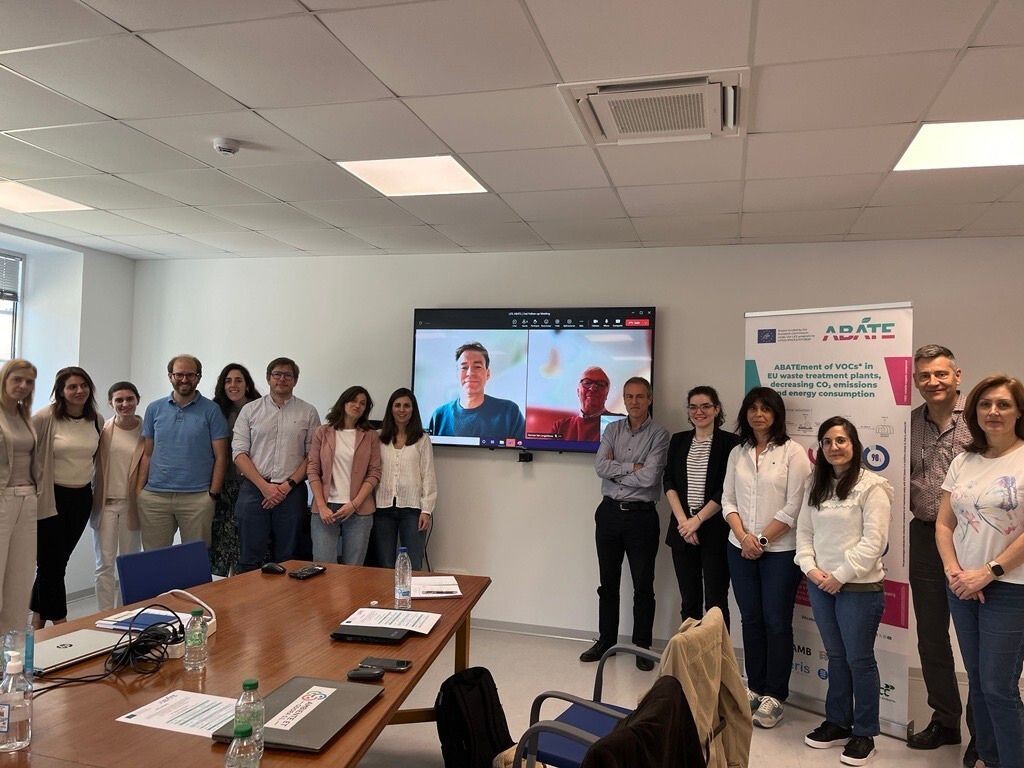On June 13th, the city of Valladolid hosted the second monitoring meeting of the LIFE ABATE project, which aims to implement an innovative air treatment system to reduce the environmental and economic impact of mechanical-biological treatment (MBT) plants for municipal waste.
Advisory Board
A significant milestone of the meeting was the introduction of the project’s Advisory Board, composed of Bart Kraakman from Jacobs Engineering Group, Carlos Nietzsche from Ambient et Odora, and Herman Van Langenhove from Ghent University. This board will play a crucial role in guiding and overseeing the project, bringing their extensive expertise and technical knowledge.
Summary of topics discussed
- Project Overview and Advisory Board Introduction. Raquel Lebrero from the University of Valladolid (UVa), coordinator of the project, presented the overall objectives of the project and the proposed technical solutions, as well as introduced the members of the Advisory Board.
- Project Management and Coordination (WP1). Raquel Lebrero highlighted the project’s management structure, including task planning, resource allocation, and contingency strategies.
- Preparatory Actions (WP2). Gloria Sánchez from the Barcelona Metropolitan Area and Aida González from Kalfrisa presented the preliminary actions necessary for the project’s success, such as updating the analytical characterisation of gaseous emissions and the detailed engineering of the LIFE ABATE solution.
- Implementation Actions (WP3). Joan Carles Fernández from the Barcelona Metropolitan Area discussed the construction, commissioning, and operation of the demonstration plant which will take place at the first demonstration site, Ecoparc 3.
- Sustainability, Replication, and Exploitation of Results (WP4). Raquel Lebrero spoke about strategies for transferring, replicating, and exploiting the project’s results, as well as validating the technical feasibility of the technologies.
- Monitoring the Impact of Project Actions (WP5). Methods for monitoring and evaluating the project’s environmental and socioeconomic impact were discussed.
- Dissemination and Communication Strategy (WP6). Julia Hereza from the Barcelona Metropolitan Area presented planned dissemination and communication activities, including scientific publications, participation in events, and the creation of a robust communication strategy.
- Financial Session. David González from EC-Innova provided an update on the project’s finances and the requirements to ensure continued support from the European Union.
- Progress and Current Challenges. All consortium members shared updates on progress and challenges faced to date, discussing solutions and next steps.
Next steps
The LIFE ABATE project will continue with the implementation of planned actions, focusing on validating the technologies at the first demonstration site and preparing for replication at a second site. Strategies will continue to be developed to ensure the project’s long-term sustainability and impact, as well as to disseminate its results locally, nationally, and across Europe.
This meeting in Valladolid has been a crucial step in consolidating progress and strengthening collaboration among project partners. We thank all participants for their dedication and commitment to innovation and sustainability.
Onwards to a greener future!

